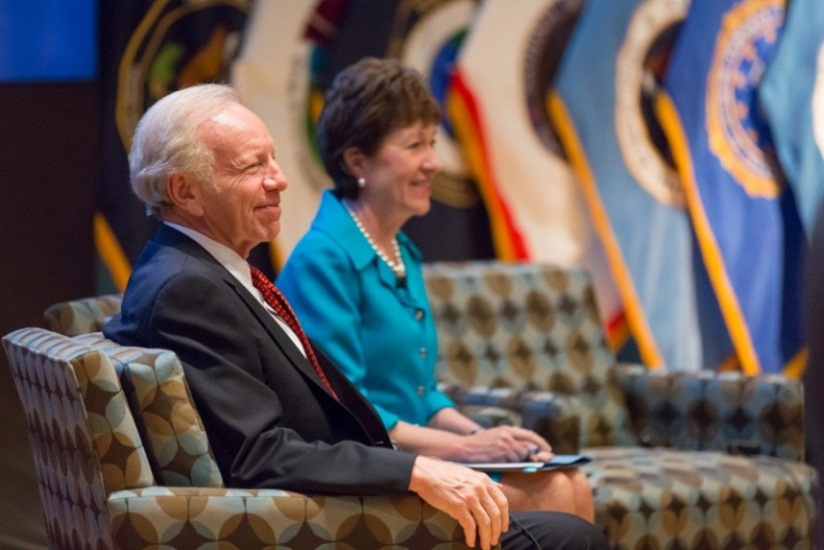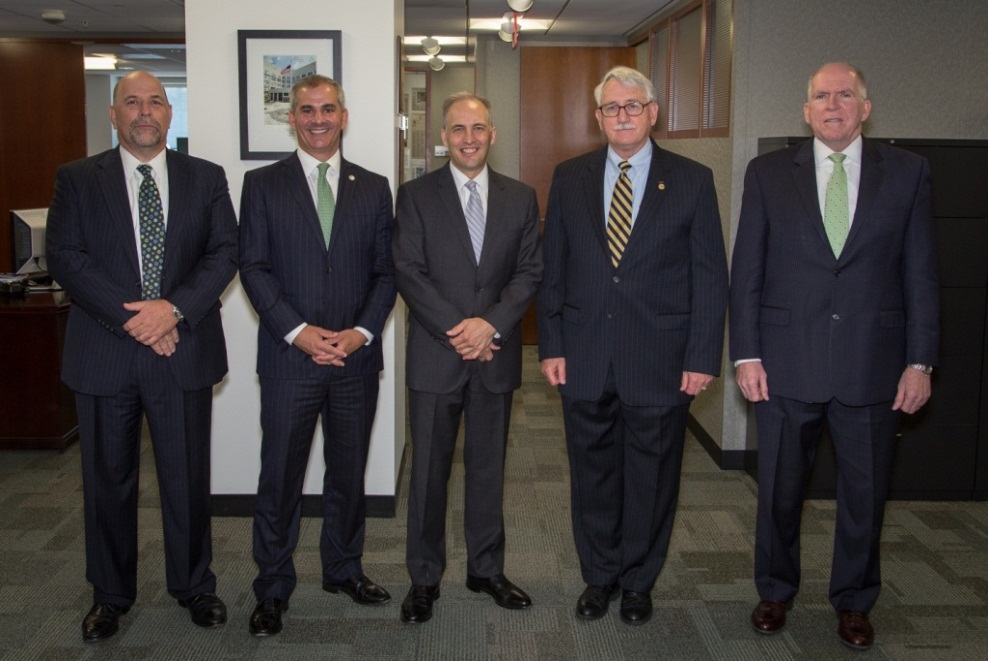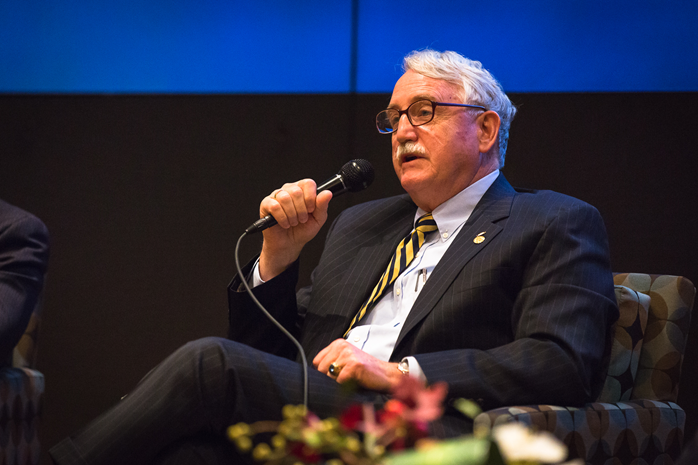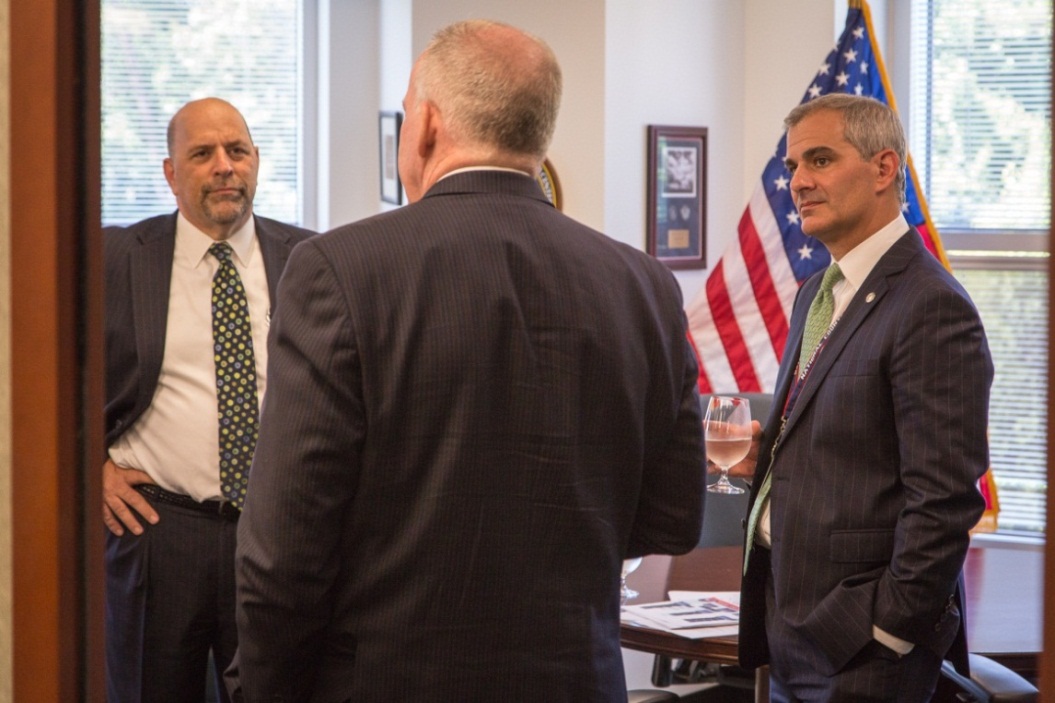As the National Counterterrorism Center enters a new decade, its founders and former leaders reflect on the defining moments and challenges they faced standing up a new organization.
September 29, 2014
ODNI Public Affairs
This August marked the National Counterterrorism Center’s (NCTC) first decade of service. To honor its ten-year anniversary, NCTC hosted a panel discussion with its former directors John Brennan, Vice Admiral Scott Redd, Michael “Mike” Leiter and Andrew “Andy” Liepman. The center also held a program with the Congressional team behind much of the Intelligence Reform and Terrorism Prevention Act (IRTPA) legislation: Senators Susan Collins and Joe Lieberman (ret.). Both events provided a unique look into a short but storied history of ten challenging, yet rewarding years of forging the center’s now respected place in the counterterrorism community.
During their program, Senators Collins and Lieberman recalled the political and social climate across the country right after The 9/11 Commission Report was released in July 2004, two and half years after the attacks. They also shared what it was like for them to work together on the bill that officially stood up NCTC (as a national intelligence center) and the Office of the Director of National Intelligence.

The congressional team behind much of the IRTPA legislation Senators Susan Collins and Joe Lieberman (ret.) attend a program to commemorate the NCTC’s decade of service at ODNI’s LX auditorium in June. (ODNI Public Affairs)
"There was a feeling throughout the country that we had to pull together, as we did immediately after the attacks on 9/11, and the long awaited report of the 9/11 Commission set out extensive recommendations for the most sweeping overhaul of the Intelligence Community since World War II,” said Collins. “They [Bill Frist and Tom Daschle] settled on Joe Lieberman and me because we worked so well together and knew government organization, but also because we could push back against the forces—both within the executive branch and within Congress—that did not want to see the far sweeping reforms take place.”
|
“Ten years later, they’ve lost [the turf battle], and NCTC and the effectiveness of our entire counterterrorism operation has won. You’d have to really search far and wide to find somebody who would say NCTC and the DNI are not here to stay.” |
Lieberman added that while they originally thought their biggest battle would come from CIA, instead it came from the Defense Department. “There wasn’t really partisan conflict about this. This was all about members of Congress, particularly heads of committees of both parties, that were accountable to agencies of our government—particularly DOD—fighting like hell to stop the changes that we were trying to make. But ultimately we were able to do it. We had to compromise, but I think in the end, something very important happened and you have all made it real.” |
Both Senators expressed how proud they are of NCTC as it approaches its “tween” years, and noted their appreciation for the work it does to protect America. “Back then, if you had told us that we’d go ten years without a catastrophic attack on the homeland, I think we would have been very dubious about that,” said Collins. “There is no doubt that information sharing is far superior to what it was prior to our passing of the law in 2004, and there is no doubt that the talented workforce here at NCTC has made a huge difference.”
“You have made a vision real and you made it work,” added Liebermann. “Ten years later, they’ve lost [the turf battles], and NCTC and the effectiveness of our entire counterterrorism operation has won. You’d have to really search far and wide to find somebody who would say NCTC and the DNI are not here to stay.”

NCTC directors past and present (left to right): Andrew Liepman, Michael Leiter, Matthew Olsen, Vice Adm. Scott Redd and John Brennan prior to the former directors panel held in June. (ODNI Public Affairs)
The turf battles were also a theme at the former director’s panel, which was moderated by the current NCTC Director Matthew Olsen. The center’s first director and current CIA Director John Brennan, shared that early on there were a lot folks who were hoping that NCTC’s predecessor, the Terrorist Threat Integration Center (TTIC) and then NCTC, would be a “flash in the pan and go away.”
|
“Being able to ensure that the idea of TTIC and the concept of NCTC was not just going to survive, but was going to become such an integral part of the Intelligence Community … really just made me feel good about being part of something that has given birth to a tremendous capability. I can’t envision the community or the counterterrorism effort of the U.S. government existing today without NCTC.” NCTC’s first director and current CIA Director John Brennan |
"I think people were hoping that this was not going to live on because they saw this as a threat,” said Brennan. “Being able to ensure that the idea of TTIC and the concept of NCTC was not just going to survive, but was going to become such an integral part of the Intelligence Community … really just made me feel good about being part of something that has given birth to a tremendous capability. I can’t envision the community or the counterterrorism effort of the U.S. government existing today without NCTC.” |
The directors were asked to describe the days or moments they were most proud of from their tenure with NCTC. Incidentally, those best days also happened to be some of the defining moments that contributed to the overall growth and reputation of NCTC.
Vice Adm. Scott Redd, who took over as the center’s director in 2005, recalled the UK aviation plot that was disrupted in early August 2006 as his proudest day, because “NCTC swung into action … and it really worked out just the way the IRTPA legislators and the people who designed it had hoped.” He explained that a month before, the president had signed off on how they were going to do strategic operational planning for counterterrorism activities. So for him, “It was just a satisfaction of seeing the way everybody had come together and it was kind of a graduation exercise.”

Vice Adm. Scott Redd answers a question during the NCTC former director’s panel held in June at ODNI’s Liberty Crossing auditorium. (ODNI Public Affairs)
According to Mike Leiter, NCTC’s director from 2007 to 2011, the Christmas day underwear bomber of 2009 wasn’t NCTC’s finest hour, but he was really proud of how the organization responded. Leiter commended the organization for rising above the behind-the-scenes bureaucratic warfare and really focusing on improving the institution during a time when it was being attacked from the outside.
“Indisputably, NCTC led the interagency discussion about how things would be improved, about how intelligence would be better integrated, how information would be shared more effectively,” said Leiter. “And not in a pie-in-the-sky way of saying, ‘Oh the cloud will fix it,’ in a very concrete way of what can we do now.”
Leiter also recalled the days where he saw the pride and the people of the organization identifying themselves as NCTC’ers as a moment of maturity. “It was the confirmation or bat mitzvah of the institution feeling like it was not just a part of this fight, but it was central to this fight,” said Leiter. “Those are the moments where you look out and see the crowd and you say ‘This is why we are here; we’re really proud of what we do.’ ”
Olsen asked the panel to discuss the challenges they encountered as a new organization, particularly when it came to building a strong and diverse workforce and forging new paths for information sharing. The examples provided by the directors demonstrated just how much NCTC’s success depended on the strong partnerships and relationships it developed over the years across all levels of government.

Andrew Liepman discusses the challenges he encountered early on as an NCTC leader during the former directors panel held June 2014 at ODNI’s Liberty Crossing Auditorium. (ODNI Public Affairs)
|
“When I came to NCTC, I don’t think I realized how hard it would be … We were the new guys on the block. We were competing with everyone else for resources, for people, for attention, and we were gradually taking all three of those things in pretty good amounts.” |
Andy Liepman, who served as director of NCTC’s directorate of intelligence from 2006 to 2011 and acting director of NCTC in the summer of 2011, shared that gaining traction for NCTC was a pretty complicated process. “We had to prove ourselves,” he said. “When I came to NCTC, I don’t think I realized how hard it would be … We were the new guys on the block. We were competing with everyone else for resources, for people, for attention, and we were gradually taking all three of those things in pretty good amounts.” |
According to Leiter, leadership really took the time and effort to recruit, and to help those who were leaving NCTC obtain a good position when returning to their home agency. “By doing that, it was making sure they were going to get the best people and the best people felt rewarded when they were here,” he said. “In my view, it was worth the investment to help somebody else do their mission. In the long run they would see the benefit of NCTC, and they would become better participants.”
“In my view, it was worth the investment to help somebody else do their mission. In the long run they would see the benefit of NCTC, and they would become better participants.”Michael Leiter, NCTC’s director from 2007 to 2011 |
Brennan noted that the hard work in the early days paid off, as NCTC is now a recognized center of excellence on terrorism, but that looking forward, there are going to be some tough days ahead. “Unfortunately I think the memories have faded about the burning embers of the World Trade Center, and there’s gonna be a lot of folks on the outside looking in who are going to criticize what we do,” he said. “We haven’t seen the apex of this religiously-driven, ideologically-driven terrorism, and so NCTC’s role is going to be very important in terms of making sure we have a good sense of the threat, but then we are also able to mitigate that threat.”
|

NCTC Director Matthew Olsen (center) shares a laugh with former NCTC directors Michael Leiter (left) and John Brennan (right) prior to the June 2014 NCTC directors panel. (ODNI Public Affairs)
The directors offered some final thoughts at the end of the program, each reinforcing the important contribution NCTC makes to keep Americans and even its toughest critics safe. Both Liepman and Leiter pointed out that it’s easy to forget how big the world is and advised the workforce to find opportunities to interact with people who have nothing to do with the counterterrorism community. “You need to get out of the bubble and get in touch with the rest of the country,” said Liepman. Leiter added, “That is [not only] critical for giving you a perspective on a) how important your work is; but [also] b) to give you new ideas on how you can do your work better.”
"All of you have this business in your blood,” said Brennan during his closing thoughts. “Take pride in your work, really feel good about the contribution you’re making to national security and keeping your fellow Americans as well as others safe. This country’s gonna rely on you—even those critics who are out there—you help keep them safe on a daily basis, and you should feel really good about that.”
Leiter relayed his statement to new employees at orientations. “On that lousy day, go up and look at the memorial up there. And if it still feels like just an eight-hour day job when you look at that ... then it’s time to move on.”




